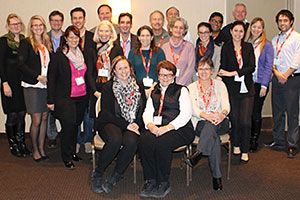UOIT's Dr. Meghann Lloyd helping create new health opportunities for Special Olympians
December 22, 2014

People with intellectual disabilities experience significant health disparities and have more unmet health needs than the typical population. Over the past 15 years, Special Olympics International has conducted more than 1.4 million free health screenings of Special Olympics athletes in more than 100 countries, building one of the largest international databases in the world on the health of people with intellectual disabilities.
To date, there has been limited strategic analysis or dissemination of the results of these Special Olympics’ Healthy Athlete Screenings. The organization is now working with researchers to create a vision for the future of these important health screenings and to develop new methods to effectively use that scientific information improve health opportunities for Special Olympians.
In early December, Dr. Meghann Lloyd, Assistant Professor, Faculty of Health Sciences at the University of Ontario Institute of Technology (UOIT) joined two dozen researchers, stakeholders, clinicians and policymakers in Toronto, Ontario to discuss how they can help Special Olympics International achieve its goals. The gathering of experts from across North America was made possible through a Planning and Dissemination grant from the Canadian Institutes of Health Research (CIHR) and matching funds from Special Olympics Canada.
“Our meeting was a huge success – as a group we have made a significant step forward in using this unique database, not just the information we already have, but to tap into the potential offered by new directions,” said Dr. Lloyd. “We are grateful to our funders who are supporting our goal to better understand the health of Special Olympians. The work has just begun.”
Dr. Lloyd’s academic research partners are Dr. Viviene Temple of the University of Victoria, and Dr. John Foley, State University of New York (SUNY) at Cortland.



